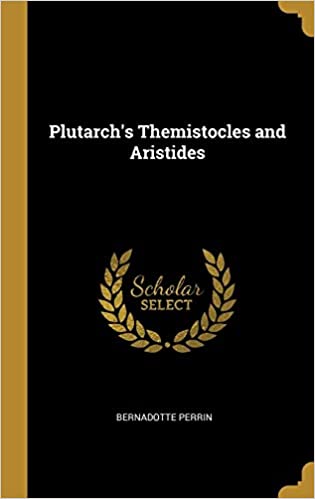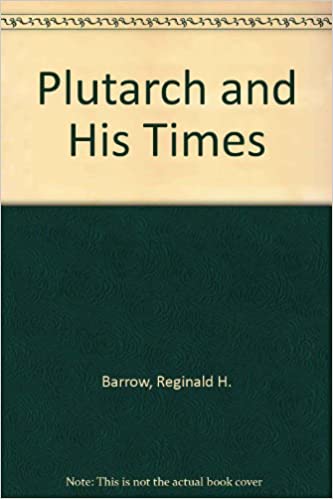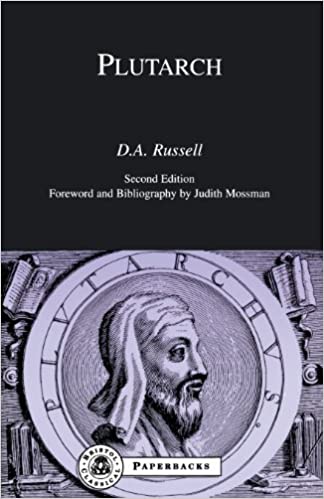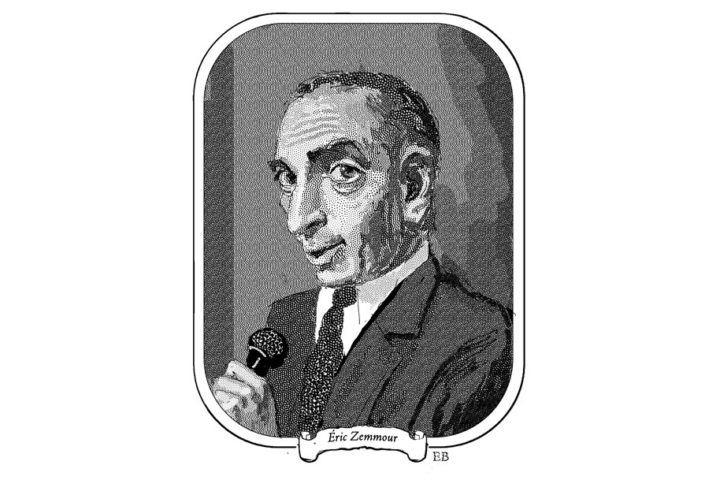Books Reviewed
If one were to set out upon the Plutarchian venture of a modern Parallel Lives, who might be among one’s subjects? William Gladstone and Woodrow Wilson, perhaps, or Winston Churchill and Franklin Delano Roosevelt? The two murderous tyrants, Josef Stalin and Adolf Hitler, clearly qualify. Might those generals turned politicians, Charles de Gaulle and Dwight David Eisenhower? Mahatma Gandhi and Martin Luther King, Jr., are fairly obvious choices. An earnest progressive would surely wish to include Benito Mussolini and Donald J. Trump. Finding a parallel for Abraham Lincoln could prove a problem.
The idea of canvassing parallel lives—one Greek, one Roman, each presented singly in a biographical essay, then the two compared—was first put to impressive effect by Lucius Mestrius Plutarchus (circa A.D. 46-120). A citizen of Chaeronea, a town in Boeotia near Delphi, Plutarch was the son of a prosperous father and studied under, among others, the philosopher Ammonius in Athens, seat of all learning in the ancient world. As Bernadotte Perrin wrote in his study Plutarch’s Themistocles and Aristides (1901):
After Athenian education, generous travel, mild diplomacy, modest literary celebrity, and considerable residence at Rome, Plutarch seems to have retired to his little country town with his books, notes, lectures, essays, and gentle philosophy, and there, in a leisure not greatly encroached upon by local magistracies and certain religious offices at neighboring Delphi, to have elaborated the sketches of his lectures and essays, and composed the work on which his fame chiefly rests—the Parallel Lives of Greeks and Romans.
Plutarch’s oeuvre fills no fewer than 26 volumes in the Loeb Classical Library. A literary man as well as a lecturer and teacher, he wrote the works now collectively known as his Moralia, which includes dialogues, table talk, attacks on rival philosophical schools, and literary criticism. The Moralia provides essays on such various subjects as how to tell a flatterer from a friend, how to achieve tranquility of mind, estimates of the size and content of the moon; and asks how it happens that mules are barren, whether land or sea animals are more intelligent, how a young man ought to hear poems, and much more.
In earlier days, some writings were misattributed to Plutarch. We also know that some of his writings have been lost, notably his book on his fellow Boeotian Pindar, and his portraits of Epaminondas, the Theban general who was one of Plutarch’s personal heroes, and Scipio Africanus. In his book Plutarch (2002) Robert Lamberton explains that Plutarch “did not invent the Greek literary consolation or the sermon-like admonitory essay any more than he invented the Greek tradition of biography, but the accidents of transmission have left him at the source of all these traditions in the preserved literature.”
In an incisive introduction to the Penguin Classics edition of Plutarch’s Essays, Ian Kidd, the Scottish classicist, recounts the rise, fall, and ultimate endurance of Plutarch’s reputation. His writings went out of vogue for more than a millennium, interest in him reviving only in the Renaissance with his rediscovery by a Byzantine monk named Maximus Planudes. A French translation of the Parallel Lives by Jacques Amyot in 1559 and of the Moralia in 1572 put him firmly back on the intellectual map. Erasmus was a great booster of his works, and even more so was Michel de Montaigne, who exulted in him. Francis Bacon and Ben Jonson read Plutarch. William Shakespeare’s debt to him is of course well known. John Dryden wrote a biographical introduction to a new English translation of the Parallel Lives.
But then, Plutarch’s reputation fell again in the 18th century, when scholars found flaws in his history—inaccuracies, exaggerations, distortions—though he, Plutarch, never claimed to be a historian. Gradually it re-arose to where it is today, when he is rightly understood to be neither a systematic nor original thinker, but the ancient world’s first man of letters, a writer of wide curiosity, cordial style, far-ranging interests—in short, an essayist. As Ralph Waldo Emerson put it about the 80 or so essays that constitute the Moralia: “Whatever is eminent in fact or fiction, in opinion, in character, in institutions, in science—natural, moral, or metaphysical—or in memorable sayings, drew his attention and came to his pen with more or less fulness of record.”
Observations, Advice, and Unresolved Matters
Demonstrating Plutarch’s immense range of knowledge, the Moralia is of interest not least for Plutarch’s asides, tangential observations, and charming anecdotes. Widely read and genuinely learned, he was also impressively quotatious; scholars have toted up more than 7,000 quotations in his works. A natural storyteller, he had a mind of great liveliness. Everywhere in the Moralia, as in the Parallel Lives, one comes across an arresting passage, a remarkable aperçu, facts that command one’s attention.
In the Moralia, on the question of “Whether There Can Be New Diseases, and How Caused,” one finds: “Thus truth is simple, and but one; but falsities innumerable.” If you happen to be a contented carnivore, you might want to steer clear of Plutarch’s essay “The Eating of Flesh,” in which he instructs that the eating of meat “is a savage and intemperate habit, that it brings sickness and heaviness upon the body, and that it inclines the mind more brutishly to bloodshed and destruction.” As an older player I found his analogy between old age and drunkenness disturbingly accurate:
[I]t is easy to observe that age of itself hath all the symptoms of drunkenness. These symptoms everybody knows; viz., shaking of the joints, faltering of the tongue, babbling, passion, forgetfulness, and distraction of the mind; many of which being incident to old men, even whilst they are well and in perfect health, are heightened by any little irregularity and accidental debauch.
Plutarch instructs that it is best to lie with a woman at night,
for, in my opinion, night is a very convenient veil, spread over those that give themselves to that kind of pleasure; for it is not fit that day should be the time, lest modesty should be banished from our eyes, effeminacy grow bold, and such vigorous impressions on our memories be left, as might still possess us with the same fancies and raise new inclinations.
He also cites Solon’s advice to make love to one’s wife three times in a month. As for wealth, anticipating Thorstein Veblen by nearly two millennia, Plutarch notes that “it would not be wealth…unless it had witnesses.” He advises “never to ask a man about his own calamities.” He calls “dancing mute poetry, and poetry speaking dancing,” and quotes the Greek poet Simonides who called “painting silent poetry, and poetry voiced painting.” To philosophize at table, he thinks, is a dangerous enterprise, for while “the very jests and merry talk of true philosophers move those that are not altogether insensible,” we must nevertheless “forbear all contentions and (to use Democritus’ words) wrangling disputes, which perplex the proposers with intricate and inexplicable doubts, and trouble all the others that are present.” Meanwhile, he reminds us that “a familiar and pleasant friend [is] indeed the best and most divine sauce that can be at an entertainment.” As R.H. Barrow notes in his Plutarch and His Times (1967), “Plutarch can be dull, but not for long.”
Some of Plutarch’s writing in the Moralia disappoints. On the great subject of fate, which plays so central a role in the Parallel Lives, he is less than adequate. In more than one of his dialogues nothing like conclusions result. Much of the writing in the Moralia tends to be aporetic, expressing doubt on a subject but otherwise leaving important matters unresolved. Montaigne, the ultimate essayist—and to “essay” means of course to attempt—found this not a problem but a virtue, writing of Plutarch: “How many times does he present us with two or three contradictory explanations of the same subject, along with a variety of causes, without making a choice and telling us which we must embrace.”
Action and Character
Before setting to work on Parallel Lives, Plutarch thought himself chiefly a philosopher. In this realm he was a self-declared Platonist, though departing from Plato on the subject of homosexuality, holding that heterosexual love ending in marriage and not homosexual love was the best, because closest to divine, arrangement. Otherwise Plutarch believed Plato “the first and chiefest philosopher that knew how fate accords with fortune, and how our free will is mixed and complicated with both. And now he hath admirably discovered what influence each hath upon our affairs.”
In the Moralia, Plutarch launches extended attacks on the two chief rivaling philosophical schools of the day, the Stoics and the Epicureans. Of the Stoics he writes that “these men have left no one of the absurdest things unspoken or unattempted.” As for the Epicureans, with their forsaking of the gods and of the active life in favor of the life of pleasure, they disqualify themselves by never having produced any figures of consequence. “But out of the school of Epicurus, and from among those who follow his doctrine,” Plutarch writes, “I will not ask what tyrant-killer has proceeded, nor yet what man valiant and victorious in feats of arms, what lawgiver, what prince, what counsellor, or what governor of the people; neither will I demand, who of them has been tormented or has died for supporting right and justice.”
That passage from his attack on the Epicureans foreshadows Plutarch’s own passionate interest in the men—tyrant killers, warriors, monarchs, counsellors, and governors—who will be the subjects of his Parallel Lives. Whatever his interest in philosophy and culture, however considerable his own literary skill, Plutarch favors men of action over men of thought. The point is italicized in his essay “Whether Military or Intellectual Exploits Have Brought Athens More Fame.” There he argues that military deeds take precedence over poetry and dramatic accomplishments because “words do not create deeds, but it is the deeds which cause the words to be regarded as worth listening to” and “even poets regard events as more essential and important than words.” An interesting position, this, for a man who worked exclusively in words.
Ian Kidd makes the point that Plutarch did not so much argue as illustrate his points, and notes that his was “a style of illustration rather than argument, modeled to create mental images fixed by human examples, by anecdote and simile.” Which is why Plutarch’s status today is, or ought to be, that of a moralist of high literary sensibility rather than based on his accuracy or authority as a historian, which he never claimed to be. In his “Life of Alexander,” after all, Plutarch wrote:
My design is not to write histories but lives. And the most glorious exploits do not always furnish us with the clearest discoveries of virtue or vice in men; sometimes a matter of less moment, an expression or a jest, informs us better of their characters and inclinations than the most famous sieges, the greatest armament, or the bloodiest battles.
Montaigne, 15 or so hundred years later, concurred: “Now the most appropriate historians for me are those who write men’s lives, since they linger more over motives than events, over what comes from inside more than what happens outside. That is why, of historians of every kind, Plutarch is the man for me.”
Recalling Grandeur
Although Plutarch continued his discursive writings after he had turned to writing the Parallel Lives, D.A. Russell, in his Plutarch (1972), for the Duckworth Classical Life and Letters series, writes that “biography proved his literary home,” and of course the form that would secure his enduring fame. The first thing to be said about the surviving lives is that they are immensely readable. Part of this is owing to the inherent interest in men whose careers as generals or governors affected those of thousands of others, but perhaps the greater part is owing to Plutarch’s understanding of the role of fortune and character in the lives of such men. (Plutarch honored women of noble bearing and courage, but apart from Cleopatra in his “Life of Antony” no woman in the Parallel Lives gets extended attention.) In all his lives, Plutarch asks if the subjects were good men. Decency, generosity, disinterest, continence in power, all are included in Plutarch’s ethical accounting. As Russell notes: “Kindness and all the gentler and more humane forms of arete, are [for Plutarch] of the essence of the good life. Without them, courage becomes mere aggressiveness and ends in brutality.”
Plutarch is not generally a harsh critic of his biographical subjects. Though he never forgets Euripides’ admonition that “Virtue and vice ne’er separately exist, / But in the same acts with each other twist,” the conquest of virtue over vice pleases him most. In his “Life of Cimon” he writes:
Since it is difficult, or rather perhaps impossible, to display a man’s life as pure and blameless, we should fill out the truth to give a likeness where the good points lie, but regard the errors and follies with which emotion or political necessity sullies a career as deficiencies in some virtue rather than displays of viciousness, and therefore not make any special effort to draw attention to them in the record. Our attitude should be one of modest shame on behalf of human nature, which never produces unmixed good or a character of undisputed excellence.
If there may be said to be a plan or program behind the selections that constitute the Parallel Lives, it is perhaps to remind those long under Roman rule of the former grandeur of Greece. Such is the view of Lamberton, who finds the overall effect of the Parallel Lives “amounts to a recreation of history along new lines, elevating Greece from its marginality and asserting a very peculiar equation of entities [with Rome] that are in some sense equal.” Plutarch will have none of the platitude which holds that Rome conquered Greece through military might but Greece really conquered Rome through Roman adoption of Greek culture. For him, at least in the Parallel Lives, Greek achievements in the field were every bit as great as those of the Romans. Plutarch’s argument against Herodotus, in his essay “The Malice of Herodotus,” is in the end about the historian’s defaming Greece. After commending Herodotus’ style, he writes: “But as in roses we must beware the venomous flies called cantharides; so must we take heed of the calumnies and envy lying hid under smooth and well-couched phrases and expressions, lest we imprudently entertain absurd and false opinions of the most excellent and greatest cities and men of Greece.”
The Tutelary Impulse
At the opening of his Life of Timoleon (411-337 B.C.), the Corinthian general and statesman, Plutarch sets out the purpose of his writing biography: “It was for the sake of others that I first commenced writing biographies; but I find myself proceeding and attaching myself to it for my own; the virtues of these great men serving me as a sort of looking-glass, in which I may see how to adjust and adorn my own life.” He then goes on to explain his method, which is
by the study of history, and with familiarity acquired in writing, to habituate by my memory to receive and retain images of the best and worthiest characters. I am thus enabled to free myself from any ignoble, base, or vicious impressions contracted from the contagion of ill company that I may be unavoidably engaged in; by the remedy of turning my thoughts in a happy and calm temper to view these noble examples.
The tutelary impulse is rarely absent from Parallel Lives.
Wherever possible Plutarch informs us of his subjects’ lineage, tells us what they looked like, recounts their wealth and attitudes toward wealth, sets out their sexual and other appetites. He describes Pyrrhus of Epirus’ strange teeth (“he had not a regular set of upper teeth, but in place of them one continued bone, with the small lines marked on it, resembling the divisions of a row of teeth”). Pericles, we learn, had an oddly shaped head, longish and out of proportion to his body, so that “almost all the images and statues that were made of him have the head covered with a helmet, the workmen apparently being willing not to expose him.” Cato the Younger, a man “of ruddy complexion and grey-eyed” whose “fame was greater than his power,” did not find fault with those who sought to profit from spoils, but would himself “rather compete in valor with the best, than in wealth with the richest, or with the most covetous in love of money.” Caius Gracchus, we learn, was “not the least likely to be contented with a life of eating, drinking, and money-making.”
The secondary characters in the Parallel Lives are themselves often of great interest. In the “Life of Lucullus,” for example, we learn of one Praecia, “a celebrated wit and beauty, but in other respects nothing better than an ordinary harlot; who, however, to the charms of her person adding the reputation of one that loved and served her friends, by making use of those who visited her to assist their designs and promote their interests, had thus gained great power.” In the “Life of Alcibiades,” Phaeax turns up, “the best of talkers, and of speakers worst,” a consummate wheeler-dealer in private, hopeless in public. Or, in the “Life of Lysander,” we learn of an Athenian captain Philocles, “who persuaded the people to pass a decree to cut off the right thumb of captives in the war [against the Persians], that they should not be able to hold the spear, though they might the oar.” The casual violence of warfare in the ancient world always freshly astonishes.
Properly opposed to tyranny in all forms though he was, Plutarch was not in any sense in favor of democracy. In his life of Solon, Anacharsis, a 6th-century Scythian philosopher, upon visiting the Athenian assembly, “expressed his wonder at the fact that in Greece wise men spoke and fools decided.” Of the Athenians ostracizing the general Cimon, Plutarch writes that “high and noble minds seldom please the vulgar, or are acceptable to them; for the force they use to straighten their distorted actions gives the same pain as surgeons’ bandages do in bringing dislocated bones to their natural position.” Wise leaders, whether they be emperors, oligarchs, or former generals, were what Plutarch favored over the mob.
Lives Everlasting
Throughout the Parallel Lives play prophecies, omens, and visitations from the various gods. In Plutarch’s pages flames leap from unknown sources, ravens eat their young, vultures aloft form strange patterns, mice gnaw consecrated gold in temples. Divination is required to interpret all these strange happenstances. Vast numbers of troops are stalled awaiting an encouraging interpretation of the arrangement of the entrails of a sacrificial oxen. Did Plutarch himself believe in such matters? Perhaps it is best to say that he did not altogether disbelieve in them. In his “Life of Coriolanus” he writes:
For either we must get rid entirely of divine influence on causation and origination in the sphere of human life or we must accept that the gods do aid and cooperate with men in the mode which I have described. They do not, of course, shape the body or change the position of the hands and feet to get the desired result, but they excite the energies and the will by offering principles of action and presenting images to the imagination and thoughts to the mind, or else they deflect and inhibit them in the same way.
As for the individual lives, 50 of which appear in the Modern Library version, they vary in length and in quality. The Roman lives tend to be longer, if only because more documentation was available to Plutarch in the writing of them, though apparently he only learned Latin in middle-age and never gained full fluency in the language. A few of the lives are marred by Plutarch’s unwillingness to render firm judgments of his subject; a few disappoint, as does for me the “Life of Marcus Furius Camillus” (446-365 B.C.), doubtless owing to the thinness of material on him available. But the grand subjects—the Spartans Lycurgus and Lysander, the Athenians Pericles and Alcibiades, the Romans Julius Caesar and Antony—come through splendidly. Not that any of the lives is definitive, but, then, definitiveness was never Plutarch’s aim nor is it that of any essayist. Some have found the brief comparisons between the individual Greek and Roman lives skimpy, obvious, even condescending—Plutarch far from his best. I am not among them.
Penguin and other publishers have decoupled and repackaged the original comparisons, producing The Fall of the Roman Republic: Six Lives (1954), The Rise and Fall of Athens: Nine Greek Lives (1960), and The Age of Alexander (1973), among others. The most recent of these is The Age of Caesar: Five Roman Lives (2017), providing Plutarch’s biographies of Pompey, Caesar, Cicero, Brutus, and Antony. But without his comparisons the larger project loses its point to illustrate the role of fortune and character in the destiny of the great figures of the ancient world, highlighting their differences, and, while at it, displaying the achievements of the Greek and Roman past. That Plutarch eminently succeeded in doing so, and that the Parallel Lives continues to find enthusiastic readers 2,000 years after he wrote them, is a tribute in good part to his literary skill but also to his charm and amiability. This most sedulous of prose portraitists of human character turns out himself to be a most appealing character, and one quite without parallel.









